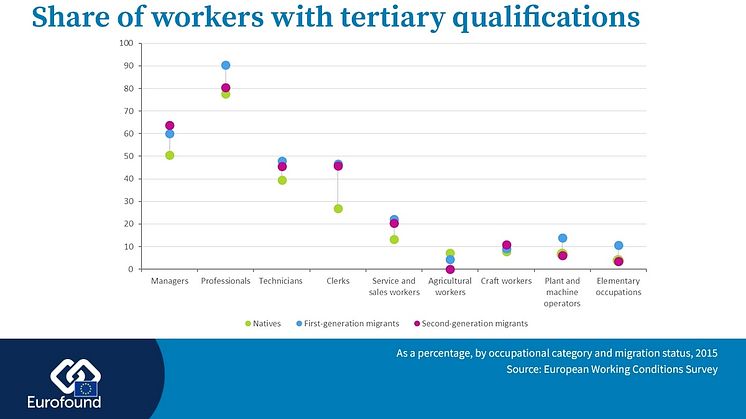
News -
Combating labour market segmentation in Europe
A common understanding of labour market segmentation is necessary to tackle poor quality jobs with lack of opportunities, affecting especially young people, women, immigrants and lower-educated individuals on the labour market. A new ambitious report from Eurofound proposes a definition of segmentation that looks beyond the type of contract and employment protection legislation (EPL) as key dimensions of this phenomenon. Combining a quantitative empirical analysis with a policy analysis, it explores and illustrates why segmentation is problematic for the labour market and society and it identifies different policy approaches which could be helpful in tackling this phenomenon in four EU Member States. The in-depth analyses were conducted in France, Germany, Spain and the United Kingdom.
Labour market segmentation refers to a situation where the labour force is divided in two or more segments between which mobility is limited, and where differences in working conditions between individuals in the labour market persist over time and cannot be attributed exclusively to differences in workers’ productivity. This means that some people enjoy stable and secure careers with better wages and development prospects, while others are trapped in employment relationships characterised by instability, uncertainty and poorer working conditions in general.
Standard open-ended contracts represent the most prevalent employment relationship across the four countries, and over a two-year period workers are most likely to remain in the same labour market state. Nevertheless, the empirical analysis, which adopts a longitudinal perspective and classifies individuals into groups depending on how their trajectories develop over time, shows a different situation across the selected countries. Germany seems characterised by a less mobile labour market with fewer flows between the different labour market states and with high upward mobility and relatively low downward mobility. The UK is the most flexible labour market, and upward and downward mobility are stronger than in the other countries, but seem equally important. Spain is also a relatively mobile labour market, but worryingly it has the lowest levels of upward mobility and a relatively high risk of downward mobility, mainly for those experiencing unfavourable working conditions. And France, like Spain, is characterised by a strong incidence of non-standard employment and quite low transition rates into standard forms of employment. It suffers the challenge of a significant number of temporary employees being trapped, failing to move to permanent contracts and experiencing (relatively long) unemployment spells which may result in scarring effects.
Labour market segmentation is an important area of research and policy debate as its implications are multiple and far-reaching. Individuals in certain groups, such as women, young people or individuals with a low level of educational attainment are considered to be typically more affected by labour market segmentation. They may become trapped in poor-quality jobs, for example, with low pay, atypical working hours, low status, insecurity or lack of opportunities for career development, and experience limited access to training, housing and social security. Consequences may therefore also manifest themselves at a macroeconomic and societal levels, and may contribute to reducing social trust and confidence in democracy as these impacts threaten political stability and social cohesion.
Relevant policy interventions are needed to tackle this phenomenon. Effective policy should not only address barriers to access the upper labour market segments but also consider downward mobility and differences in working conditions. A broader policy approach, beyond EPL reforms, is encouraged. As the impacts of individual policies are very limited, integrated context-sensitive approaches combining financial incentives, regulation, monitoring and improving access to quality public services should be fostered to combat labour market segmentation.
Download the report Labour market segmentation: Piloting a new quantitative and policy analysis
Further information
Topic page Labour market change
Topic page Inclusive labour markets
Topic page Monitoring structural change and managing restructuring
Topic page Innovation and job creation
European Monitoring Centre on Change
Tackling undeclared work in Europe
Subscribe to Labour market change information and newsletter








